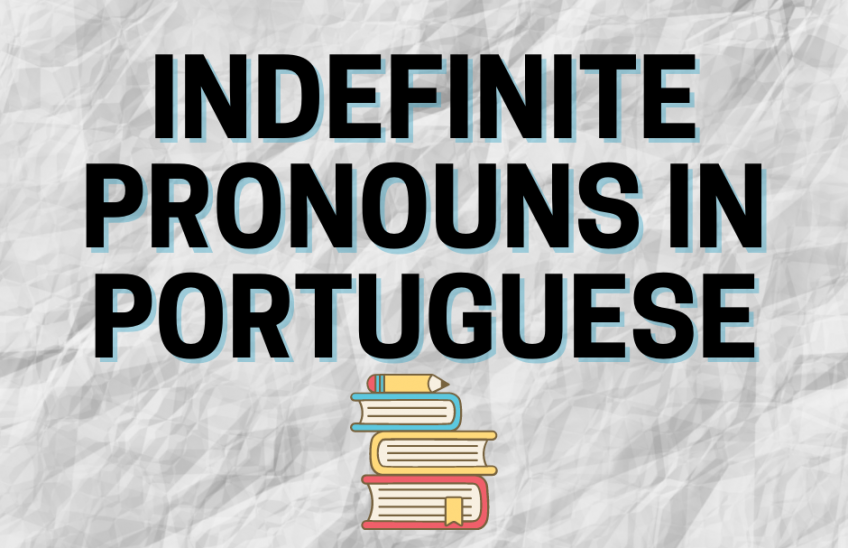Oi! Tudo bem?
Indefinite pronouns are used to talk about things, people and places without actually specifying them. When we say “something, someone, somewhere, anything, anyone…” in English, we know we’re referring to things, people or places but it’s hard to tell what their real names are. When saying “I’m going somewhere”, we could be talking about a park, a supermarket, Europe, Jupiter, anything at all! We do the same in Portuguese, and today we’ll be learning how to use these indefinite pronouns in Portuguese!
Any/Some – Algum, Alguma, Alguns, Algumas
We use “algum” for masculine words, and “alguma” for feminine words. Both of them have to be used in the singular form, and they need to be followed by a noun. When it comes to plural, we use “alguns” and “algumas”.
E.g. Você tem algum plano para hoje? (Do you have any plans for today?)
Ele tem algum dinheiro? (Does he have any money?)
Nós temos alguns lençóis para doar (We have some bedsheets to donate)
A Juliana falou com alguma médica? (Has Juliana talked to any doctor?)
Estou procurando algumas casas perto da praia (I’m looking for some houses near the beach)
Something/Anything – Alguma coisa, Algo, Qualquer coisa*
Alguma coisa and algo mean the same thing. Qualquer coisa, on the other hand, is a bit different. It’s when we use “anything” for affirmative sentences – it can be a thing of any kind.
E.g. Você quer alguma coisa para comer? (Would you like anything to eat?)
Ele quer falar alguma coisa comigo (He wants to tell me something)
Meus pais compararam algo pra mim (My parents bought something for me)
*Estou faminta! Poderia comer qualquer coisa (I’m starving! I could eat anything)
*Ela acha que poder fazer qualquer coisa aqui (She thinks she can do anything here)
*A: Vamos fazer alguma coisa? (Shall we do something?)
B: Tipo o quê? (Like what?)
A: Qualquer coisa! (Anything!)
Nothing/Anything – Nada, Nenhuma coisa
Nada and Nenhuma coisa mean the same (nada is a lot more common, though), and we use them in negative sentences. We have double negations in Portuguese, so we need to use “não” before a verb, and then “nada” or “nenhuma coisa”.
E.g. Estou guardando dinheiro, então não comprei nada (I’m saving money, so I didn’t buy anything)
Não vamos beber nada! (We won’t drink anything)
Não vi nenhuma coisa interessante na loja (I didn’t see anything interesting at the shop)
Someone – Alguém
E.g. Alguém bateu na porta (Someone knocked on the door)
Eu vi alguém entrar aqui (I saw someone get in here)
Nós estamos perdidos. Vamos pedir ajudar para alguém? (We’re lost. Shall we ask someone for help?)
No one/Anyone – Ninguém, Qualquer pessoa*
We use ninguém in negative sentences, and qualquer pessoa for affirmative sentences following the same context as “qualquer coisa” (a person of any kind). We have double negations in Portuguese, so the sentence needs to come with “não” before a verb and then “ninguém”.
E.g. Eu não contei seu segredo para ninguém (I didn’t tell your secret to anyone)
O Presidente não ajuda ninguém (The President helps nobody)
Não vi ninguém do trabalho na festa (I didn’t see anybody from work at the party)
*Qualquer pessoa faria isso (Anyone could do it)
*A Roberta está carente e ela me disse que beijaria qualquer pessoa! (Roberta is needy and she told me she’d kiss anyone)
Somewhere/Nowhere/Anywhere – Algum lugar/Nenhum lugar or Lugar nenhum/Qualquer lugar*
E.g. Vamos viajar para algum lugar no campo (We’re going to travel somewhere in the countryside)
Eles moram em algum lugar perto de São Paulo (They live somewhere near São Paulo)
Eu não quero viajar para nenhum lugar OR Eu não quero viajar para lugar nenhum (I don’t want to travel anywhere)
*A: Vamos sair daqui… (Let’s get out of here)
B: Para onde? (Where to?)
A: Qualquer lugar! (Anywhere)
Every – Todo, Toda, Todos, Todas
When using these words, we need to add a noun afterwards.
Everyone – todo mundo OR todas as pessoas
Everywhere – todo lugar or todos os lugares
Every day – todo dia
Every country – todo país
Every woman – toda mulher
E.g. Eu conheço todo mundo aqui! (I know everybody here)
Nós já viajamos para todos os lugares (We’ve travelled everywhere)
Paulo vai para o trabalho todo dia (Paulo goes to work every day)
Toda mulher já sofreu assédios nas ruas (Every woman has suffered street harassment)
Everything – Tudo
E.g. Nós sabemos de tudo! (We know everything)
Isso é tudo que precisávamos (This is everything we needed)
Está tudo bem (Everything’s fine)
Let’s practise! Vamos praticar!
- Você sabe de _____ lugar para comer comida japonesa?
- Ele conhece ______ ! Ele já visitou mais de 50 países.
- Você ouviu ______ coisa do chefe?
- Eu não vi _____ de bom na televisão.
- Você tem _____ preferência para o almoço? Não, ______ está bem para mim.
- Nós fizemos ______ que precisávamos fazer.
- Procurei, mas não encontrei ______ informação sobre o livro.
- Ontem, eu li _____ artigos para a minha prova.
- algum 2. todos os lugares 3. alguma 4. nada 5. alguma, qualquer coisa 6. tudo 7. nenhuma 8. alguns
We hope this post can help you! If you have any questions, just let us know and be sure to follow us on Instagram! @portuguese_classes_melbourne
Luciana Veloso

